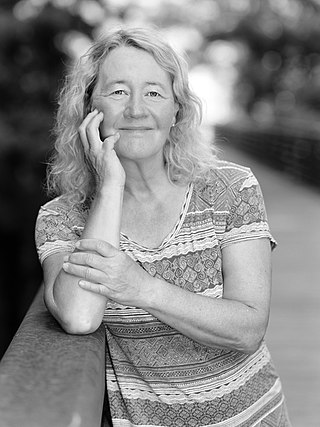
Paul Greengard was an American neuroscientist best known for his work on the molecular and cellular function of neurons. In 2000, Greengard, Arvid Carlsson and Eric Kandel were awarded the Nobel Prize for Physiology or Medicine for their discoveries concerning signal transduction in the nervous system. He was Vincent Astor Professor at Rockefeller University, and served on the Scientific Advisory Board of the Cure Alzheimer's Fund, as well as the Scientific Council of the Brain & Behavior Research Foundation. He was married to artist Ursula von Rydingsvard.

Elizabeth Helen Blackburn is an Australian-American Nobel laureate who is the former president of the Salk Institute for Biological Studies. In 1984, Blackburn co-discovered telomerase, the enzyme that replenishes the telomere, with Carol W. Greider. For this work, she was awarded the 2009 Nobel Prize in Physiology or Medicine, sharing it with Carol W. Greider and Jack W. Szostak, becoming the first Australian woman Nobel laureate.
The Canada Gairdner International Award is given annually by the Gairdner Foundation at a special dinner to five individuals for outstanding discoveries or contributions to medical science. Receipt of the Gairdner is traditionally considered a precursor to winning the Nobel Prize in Medicine; as of 2020, 98 Nobel Prizes have been awarded to prior Gairdner recipients.
The Louisa Gross Horwitz Prize for Biology or Biochemistry is an annual prize awarded by Columbia University to a researcher or group of researchers who have made an outstanding contribution in basic research in the fields of biology or biochemistry.

Carolyn Widney Greider is an American molecular biologist and Nobel laureate. She is a Distinguished Professor of Molecular, Cell, and Developmental Biology at the University of California, Santa Cruz.
The Dickson Prize in Medicine and the Dickson Prize in Science were both established in 1969 by Joseph Z. Dickson and Agnes Fischer Dickson.
The United States-Israel Binational Science Foundation (BSF) is a grant-awarding institution that promotes collaborative research in a wide range of basic and applied scientific disciplines, established in 1972 by an agreement between the governments of the United States and Israel. Numerous scientists participating in BSF programs have won prestigious awards such as the Nobel, Lasker and Wolf prizes. The Foundation grant recipients include 43 Nobel Prize laureates, 19 winners of the Lasker-DeBakey Clinical Medical Research Award, and 38 recipients of the Wolf Prize.

Philippa "Pippa" Marrack, FRS is an English immunologist and academic, based in the United States, best known for her research and discoveries pertaining to T cells. Marrack is the Ida and Cecil Green Professor and chair of the Department of Biomedical Research at National Jewish Health and a distinguished professor of immunology and microbiology at the University of Colorado Denver.
The Albany Medical Center Prize in Medicine and Biomedical Research is the United States' second highest value prize in medicine and biomedical research, awarded by the Albany Medical Center. Among prizes for medicine worldwide, the Albany Medical Center Prize is the fourth most lucrative.
The Paul Ehrlich and Ludwig Darmstaedter Prize is an annual award bestowed by the Paul Ehrlich Foundation since 1952 for investigations in medicine. It carries a prize money of 120,000 Euro. The prize awarding ceremony is traditionally held on 14 March, the birthday of Nobel laureate Paul Ehrlich, in the St. Paul's Church, Frankfurt am Main.
The Keio Medical Science Prize is a Japanese prize in medical sciences.

Jennifer Anne Doudna is an American biochemist who has pioneered work in CRISPR gene editing, and made other fundamental contributions in biochemistry and genetics. She received the 2020 Nobel Prize in Chemistry, with Emmanuelle Charpentier, "for the development of a method for genome editing." She is the Li Ka Shing Chancellor's Chair Professor in the department of chemistry and the department of molecular and cell biology at the University of California, Berkeley. She has been an investigator with the Howard Hughes Medical Institute since 1997.

Lucy Shapiro is an American developmental biologist. She is a professor of Developmental Biology at the Stanford University School of Medicine. She is the Virginia and D.K. Ludwig Professor of Cancer Research and the director of the Beckman Center for Molecular and Genetic Medicine.

Emmanuelle Marie Charpentier is a French professor and researcher in microbiology, genetics, and biochemistry. As of 2015, she has been a director at the Max Planck Institute for Infection Biology in Berlin. In 2018, she founded an independent research institute, the Max Planck Unit for the Science of Pathogens. In 2020, Charpentier and American biochemist Jennifer Doudna of the University of California, Berkeley, were awarded the Nobel Prize in Chemistry "for the development of a method for genome editing". This was the first science Nobel Prize ever won by two women only.

Victoria Lundblad is an American geneticist whose work focuses on the genetic control of chromosome behavior in yeast. Many of her discoveries have concerned telomerase, the RNA-containing enzyme that completes the ends of chromosomes. She works at the Salk Institute in La Jolla, California.

Katalin "Kati" Karikó is a Hungarian-American biochemist who specializes in ribonucleic acid (RNA)-mediated mechanisms, particularly in vitro-transcribed messenger RNA (mRNA) for protein replacement therapy. Karikó laid the scientific groundwork for mRNA vaccines, overcoming major obstacles and skepticism in the scientific community. Karikó received the Nobel Prize in Physiology or Medicine in 2023 for her work, along with American immunologist Drew Weissman.

Drew Weissman is an American physician and immunologist known for his contributions to RNA biology. Weissman is the inaugural Roberts Family Professor in Vaccine Research, director of the Penn Institute for RNA Innovation, and professor of medicine at the Perelman School of Medicine at the University of Pennsylvania (Penn).










